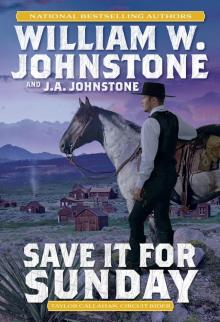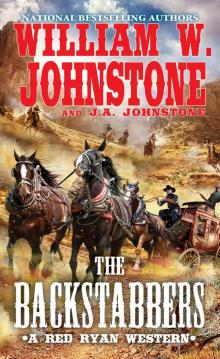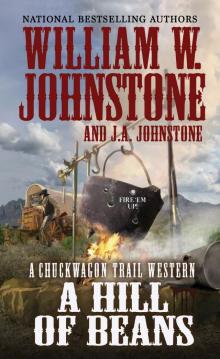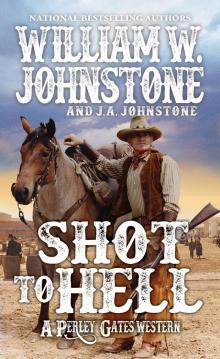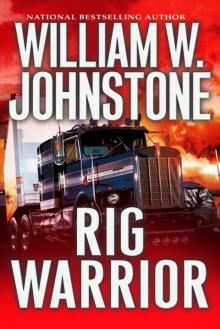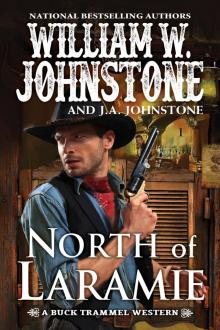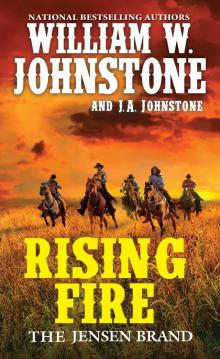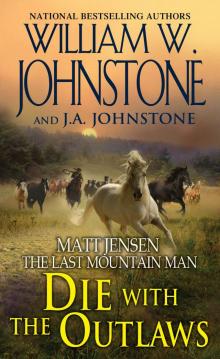Save it for sunday, p.1
Save It for Sunday, page 1





Look for these exciting Western series from bestselling authors William W. Johnstone and J.A. Johnstone
The Mountain Man
Luke Jensen: Bounty Hunter
Brannigan’s Land
The Jensen Brand
Preacher and MacCallister
Fort Misery
The Fighting O’Neils
Perley Gates
MacCoole and Boone
Guns of the Vigilantes
Shotgun Johnny
The Chuckwagon Trail
The Jackals
The Slash and Pecos Westerns
The Texas Moonshiners
Stoneface Finnegan Westerns
Ben Savage: Saloon Ranger
The Buck Trammel Westerns
The Death and Texas Westerns
The Hunter Buchanon Westerns
Will Tanner: U.S. Deputy Marshal
WILLIAM W.
JOHNSTONE
AND J.A. JOHNSTONE
SAVE IT FOR SUNDAY
PINNACLE BOOKS
KENSINGTON PUBLISHING CORP.
www.kensingtonbooks.com
Table of Contents
Also by
Title Page
Copyright Page
CHAPTER 1
CHAPTER 2
CHAPTER 3
CHAPTER 4
CHAPTER 5
CHAPTER 6
CHAPTER 7
CHAPTER 8
CHAPTER 9
CHAPTER 10
CHAPTER 11
CHAPTER 12
CHAPTER 13
CHAPTER 14
CHAPTER 15
CHAPTER 16
CHAPTER 17
CHAPTER 18
CHAPTER 19
CHAPTER 20
CHAPTER 21
CHAPTER 22
CHAPTER 23
CHAPTER 24
CHAPTER 25
CHAPTER 26
CHAPTER 27
CHAPTER 28
CHAPTER 29
CHAPTER 30
CHAPTER 31
CHAPTER 32
CHAPTER 33
CHAPTER 34
CHAPTER 35
CHAPTER 36
CHAPTER 37
Teaser chapter
PINNACLE BOOKS are published by
Kensington Publishing Corp.
119 West 40th Street
New York, NY 10018
Copyright © 2023 by J.A. Johnstone
This book is a work of fiction. Names, characters, businesses, organizations, places, events, and incidents either are the product of the authors’ imagination or are used fictitiously. Any resemblance to actual persons, living or dead, events, or locales is entirely coincidental.
To the extent that the image or images on the cover of this book depict a person or persons, such person or persons are merely models, and are not intended to portray any character or characters featured in the book.
All rights reserved. No part of this book may be reproduced in any form or by any means without the prior written consent of the Publisher, excepting brief quotes used in reviews.
PUBLISHER’S NOTE: Following the death of William W. Johnstone, the Johnstone family is working with a carefully selected writer to organize and complete Mr. Johnstone’s outlines and many unfinished manuscripts to create additional novels in all of his series like The Last Gunfighter, Mountain Man, and Eagles, among others. This novel was inspired by Mr. Johnstone’s superb storytelling.
If you purchased this book without a cover you should be aware that this book is stolen property. It was reported as “unsold and destroyed” to the Publisher and neither the Author nor the Publisher has received any payment for this “stripped book.”
PINNACLE BOOKS, the Pinnacle logo, and the WWJ steer head logo Reg. U.S. Pat. & TM Off.
ISBN: 978-0-7860-4957-8
ISBN-13: 978-0-7860-4958-5 (eBook)
CHAPTER 1
Wyoming Territory, 1876
And it came to pass . . .
It was a stagecoach, moving as though the hounds of Hell were trying to jump into the rear boot. It wasn’t a Concord, but one of those Abbott & Downing mud wagons—though the trail wasn’t even damp. Boxy-looking, not as big as a Concord and bouncing like it was out of control as the driver serenaded the six mules pulling the coach with every cuss word in his vocabulary. The leather curtains were rolled up. No guard to be seen.
Perhaps he had jumped off or quit.
The horse and rider nearby didn’t get a good look at any passengers inside.
It passed Taylor Callahan, riding the slow-footed white gelding he’d named Job, as if horse and man were standing still like wind-blown boulders sprinkled across the rolling plains.
Nary a salutation came from the driver, who spit out a stream of tobacco juice that shot past Callahan’s beard stubble like a minié ball.
And it came to pass . . .
Taylor Callahan ran those words through his mind again, nodded, and pulled down the kerchief as the dust kicked up by the mud wagon settled on the grass and rocks on the southeastern side of the trail. Yes, he could use that. It would work fine. It being the stagecoach. Pass being the verb and . . .
The jangling of traces and more ribald language caused Callahan to turn around. Could that be?
He eased Job farther off the trail, turned the gelding around to see another approaching mud wagon, also with a foul-mouthed driver and no guard. Remembering one of his pappies had always said, “Time brings wisdom to most critters,” Callahan had time and wisdom to pull up his bandanna and cover his mouth and nose again.
Once again, the driver paid no attention and made no gesture, friendly or otherwise, to the tall man in black on a white horse. But Callahan got a good look inside the coach. A handsome woman in a fine green dress, her hair in a bun, was holding what might have been a Bible. And she might have smiled at him, or perhaps Job. She even offered a friendly, fleeting wave as the coach rolled past.
Callahan let the dust settle again before he lowered the bandanna and nudged Job back onto the road. He looked behind him a good long while before he felt satisfied no more speeding mud wagons were stampeding north. And he forgot about any puns or wit he would display at his next preaching, as he just let the gelding carry him leisurely north.
However, he did keep looking over his shoulder while plodding across a country that looked like waves on the ocean. He wanted to make sure no other coaches came up behind him. The last thing he wanted was to be greeted by the Major General in the Heavens at Saint Peter’s Gate and be told he had been killed after being run over by an Abbott & Downing Company mud wagon.
The sun had started to sink behind the mountains far off to the west. Coming out of Denver, Colorado, Callahan had thought most of the Rocky Mountains would be like the Front Range just west of Denver. Mountains reaching to the skies, often their tops disappearing behind clouds. But in what Callahan figured had to be Wyoming Territory, the mountains appeared to be a good ride southwest or northwest.
Oh, they weren’t flat plains like he had seen in Kansas, or just last year way down in southern Texas. The way the wind blew the tall grass, Callahan almost thought he was in an ocean. Which reminded him: I still ain’t let my eyes feast on an ocean.
That had been his plan when he was drifting south in Texas. To see the great seas, where the whale had swallowed Jonah, though some blowhard Texan had told him he wouldn’t see an ocean, just the Gulf of Mexico, or maybe even nothing more than the Corpus Christi Bay. He had hardly seen anything wet except one of the most vicious flash floods he had ever witnessed. And coming from a childhood in western Missouri, Taylor Callahan had seen many a flood. The Mighty Missouri was no little crick when she flooded. One of the first funerals the Reverend Taylor Callahan had ever preached was for a ten-year-old boy who got caught when the Sni-A-Bar Creek got to raging.
That reminded him of the four Harris boys. If they had not been lynched or shot down like the dogs they were—May the Major General in the Heavens forgive me for thinking in such an unforgiving kind of way—they could be after him yet.
He reined in Job and looked down the trail. The dust from the two stages had long settled. No travelers could be seen as far as he could see. And he could see a right far piece in that country. Hills were all around him, popping up here and there, rocks strewn about, and he could even find a tree, usually along the creek beds, even though he’d not seen much in the way of water in those creek beds.
Strange country. Pretty, but different. It looked as though the old Major General in the Heavens had been trying to see what He or She ought to make Wyoming Territory look like. Maybe the General had decided those mountains off to the west were too much like Colorado and the Great Plains had already been perfected when Kansas got created. How about some of these red rocks and boulders and dust to blow? That ain’t half bad, but, well . . . Callahan understood. He had seen parts like that when he had left Texas and ridden up through New Mexico Territory, mostly following the Pecos River.
The hills he was riding through weren’t consistent, either. Some of them were rolling like the waves, but here and there he found buttes, mostly barren, some with boulders that appeared to have been dropped out of the sky.
Meteorites? Maybe all those shooting stars he had seen, sometimes making wishes on, though rarely, if ever, seeing one of those wishes come true. Those stars had to land somewhere. But the rocks like the two Job was riding between did not look like the moon did when she was close and shining bright, nor had that littl
Just before darkness fell, Callahan found a muddy bit of water where a little creek made a bend around another boulder, and he stopped there. Loosening the cinch but leaving the saddle on the gelding, he let Job graze and drink. Pulling another bandanna out of the saddlebag, he used it to strain water into a coffeepot. Just enough for two cups of coffee.
He built a fire, stretched his legs, pushed back his hat as the water began to boil, and turned his thoughts to how far he had ridden since Denver.
The carpenter Callahan had been working for in Fort Collins had said it was about a hundred miles from Denver to Cheyenne, but keeping track of miles traveled came hard for this circuit-riding preacher. The carpenter had hated to let Callahan go, and since they were building a church, he had kept delaying his departure, even though the church already had hired a minister who was coming in from North Platte, Nebraska, if he didn’t get scalped by Sioux and Cheyenne. The congregation was decidedly Episcopal, and Callahan had known many a fine Episcopalian, and even had enjoyed a pilsner with one of that cloth—before the War Between the States, anyway.
He had moved on to Poudreville, preached a few days at the livery, and then went through Virginia Dale, preached in a saloon, before lighting out again.
Callahan knew he was in Wyoming by now. The beer jerker at Virginia Dale had said the territory wasn’t more than a hop and a skip away. While Job had never been inclined to hop or skip, they had gotten a good start not long after breakfast.
Callahan remembered the conversation.
“Just follow the trail,” the beer jerker said, “and make good time. Indians be on the prod.”
“Most of that’s way up Montana way,” the faro dealer corrected.
“They’s enough injuns between Montana and New Mexico to give us fits.”
As he rested and drank the coffee he’d made, Callahan continued thinking about that conversation.
“Best to travel at night,” the beer jerker told him. “Injuns won’t attack at night.”
“Who told you that?” the faro dealer barked.
“An old-timer at Fort Lupton.”
“That ol’ coot? His brain left him before the Pikes Peak crowd showed up in Colorado.”
“I read that in the Denver Twice-Weekly Reporter, too.”
“You can’t read.”
“Plantin’ moon,” the beer jerker said.
“Raidin’ moon, you moron,” the faro dealer countered.
Callahan shook his head. They’d still been going at it when he had pulled on his hat and left the saloon for the stable.
He stood, massaged his thighs and buttocks, emptied bladder and bowels, washed his hands in the muddy stream, and looked at the moon. Since it was full, he figured it would be light enough to follow the road, even if the road was really nothing more than tracks of wagons—like those fool mud wagons he’d encountered—made by flattening the grass.
Callahan was used to traveling at night. Back in Missouri, he’d traveled a lot without even a moon to guide his way. But that’s what a lot of Missouri bushwhackers needed to do during the late War Between the States. Carbine Logan’s boys made a habit of not being seen. That was a long time ago though, back when Taylor Callahan was younger and impetuous, and a tad bitter and angry.
He was a changed man now.
He was also broke.
The money he had made working for the carpenter in Fort Collins did not amount to much, and while the livery in Poudreville had paid him in coffee and hard tack, the coins collected in the black hat Callahan passed around barely covered the feed bill he had been charged for Job’s appetite. He had done a wee bit better in Virginia Dale till that old codger with a wooden leg came in with a story about an ailing wife, all four kids with the croup, and not enough money to hire the barber across the way who sometimes doctored folks up.
“Here’s what I can give you, old-timer,” Callahan had said, and dumped his change into the man’s calloused hands. “As long as you promise me you ain’t buying Doctor Jasper’s Patented Soothing Syrup.”
“Cures warts,” the faro dealer had said.
“No, it don’t,” the beer jerker had argued. “But it works wonders on the grippe.”
Callahan wanted to get to Cheyenne so he could maybe get enough tithes to spend at least one night in a hotel with hot bath water and decent linens. Maybe even a shave since he had traded in his straight razor for a bit of ground coffee in Poudreville.
The faro dealer at Virginia Dale had told him not to go to Cheyenne, but make way to Laramie. It was closer and had a lot of sinners.
The beer jerker had said, “No, the real action is to be had farther west, at Fort Steele on the North Platte because nobody sins worser than soldiers that far from the civilized world.”
That’s why Callahan had picked Cheyenne.
He kicked out the fire, doused the smoke with the remnants of his coffee, and got to work on Job, tying the coffeepot to the bedroll, tightening the cinch, saying a short prayer, and eating the last bit of beef jerky he had been saving. Looking up, he checked the moon, waited for it to rise just a bit higher, and then opened the saddlebags. He pulled out the .45-caliber long-barreled Colt revolver, and checked the loads. He thought about sticking it inside the deep pocket of his black Prince Albert coat, but decided against it.
Indians might have a different color skin than Taylor Callahan, and likely practiced a different religion, but if the faro dealer had been right, Callahan would rely on his faith, and the Major General in the Heavens, to protect him. His will, or Her will, be done.
He returned the Colt to its place, fastened the buckle, moved around Job, keeping his hand on the gelding’s hide so not to get kicked, and reached the other saddlebag. Opening it, he touched the Bible, said a brief prayer, and found two corn dodgers. He thought about eating one but figured the salt would just make him thirsty, and took them to Job, letting the horse eat the stale balls of bread.
Callahan led the horse back to the trail, which would be easy to follow on a cloudless night, tightened the cinch again, and eased into the saddle.
Job snorted.
“You’ll get a fine stall and a good rubdown in Cheyenne,” Callahan told him.
That was a bit of a prayer, he realized. But maybe the Major General in the Heavens was listening and feeling charitable.
Callahan laughed when Job bucked twice, an informal protest, but the preacher was a better horseman than many people—at least those who had never known him as one of Carbine Logan’s Irregulars—realized.
“You done?” he said, then kicked the gelding into a slow walk.
“That’s what I figured.” Callahan shook his head and clucked his tongue. “Two jumps and you’re played out. Come on, boy, just follow the trail.”
He’d done some figuring while he’d rested and the way he figured, those stagecoaches that had almost run him and his horse over that afternoon would not be traveling at night. Maybe he could be out of their way by the time dawn broke if, by chance, they started making a return trip to whatever burg they had come from.
He grinned, hearing his late ma telling him with some amazement, “You got some brains beneath that hard skull of yourn that I never knowed you had, boy. How come you don’t always act like you know somethin’?”

